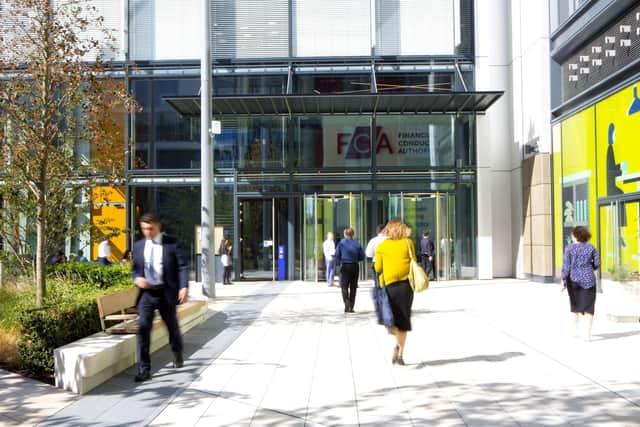Building societies won't be investigated over £138m scandal which has seen customers lose life savings and homes
Organisations including Leeds Building Society, Nottingham Building Society and Newcastle Building Society introduced customers to unregulated advisers based in their branches who sold them family trusts on their properties and investment schemes for savings.
The schemes have since become mired in financial complications linked to the collapse of a firm called Philips Trust Corporation (PTC), which had ended up in charge of the assets.
Advertisement
Hide AdAdvertisement
Hide Ad

There are more than 2,300 victims affected, with £94m worth of properties and £44m of savings caught up in the situation.
Victims have been urging the Financial Conduct Authority to investigate the role of building societies, on the grounds the mutuals gave the schemes their effective seal of approval and benefited from commission on sold policies.
But the FCA has now announced it has determined it “cannot” investigate the role of building societies in relation to the matter on the grounds the introductions were not regulated activities and that the societies did not have a direct relationship with Philips Trust.
A statement released by the FCA today acknowledged today’s decision will be “deeply disappointing for customers who have lost out” but added it believes it has no legal power to act.
Advertisement
Hide AdAdvertisement
Hide AdThe regulator also stated “It was the actions of PTC, not the building societies, which caused customers to experience investment losses. We can’t hold the building societies responsible for the actions of PTC.”
Building societies involved had worked with an organisation called Estate Planning Group, whose arms included The Will Writing Company (TWWC) and the Family Trust Corporation (FTC) and whose advisers were based in society branches.
The Will Writing Company went into administration in February 2018 and FTC was sold in April 2018 to Luxor Wells Limited, a company owned by a man named Richard Wells who became the firm’s sole director.
Mr Wells had established a separate company called Philips Trust Corporation (PTC) in December 2017. FTC clients were advised by the firm to move trusts across to Philips Trust for a fee.
Advertisement
Hide AdAdvertisement
Hide AdMr Wells resigned as a PTC director in March 2019. He was subsequently a director of the now-collapsed funeral plan provider Safe Hands, which is the subject of a Serious Fraud Office investigation.
PTC itself collapsed into administration in 2022.
Many victims now fear they will lose their life savings as administrators are struggling to recover cash from “investment management” companies their money was passed to.
More than 340 of the 447 properties held by PTC have now been returned to owners. But those involved have had to pay £2,400 each to Kroll for recoveries.
After administration, a court statement by PTC director Kay Collins revealed three properties had been sold for a collective £800,000 with the money used to repay other parties as opposed to going back to its rightful owners. Ms Collins said she felt she had “no choice” but to do so in an attempt to stave off the company’s illiquidity issues.
Advertisement
Hide AdAdvertisement
Hide AdLast year, SNP MP Peter Grant raised the Philips Trust case in Parliament and alleged the regulatory framework to protect vulnerable victims had “utterly failed”.
Leader of the House of Commons Penny Mordaunt described the matter as an “extremely disturbing and important case” and said she would be raising it with the Chancellor and Business Secretary.
The FCA ultimately issued “guidance” to PTC in January 2022 following the whistleblowing complaint, just three months before the company collapsed.
Advertisement
Hide AdAdvertisement
Hide AdGreater Manchester Police has separately paused investigations into the PTC issue and said they will only consider reopening an investigation if administrator Kroll provided the force with potential evidence of criminality. Kroll has said its administrators “continue to make themselves available to any and all enforcement authorities concerned”.
FCA explains its decision
The FCA said today: “The building societies were not carrying out a regulated activity when they referred customers to companies which were part of the Estate Planning Group.
“Our understanding, supported by the administrator, is that it was the actions of PTC, not the building societies, which caused customers to experience investment losses. We can’t hold the building societies responsible for the actions of PTC, which did not exist at the point that the building societies referred customers to the EPG.”
The statement did add that some building societies are discussing with administrators “some possible support to affected customers on a voluntary basis”.
Advertisement
Hide AdAdvertisement
Hide AdA spokesperson from the Building Societies Association said: "The BSA, along with our members, are very concerned by the difficult situation being faced by people who have been affected by the investments made through the Philips Trust Corporation and it subsequently entering administration in 2022.
“The building societies concerned have been clear with us that they did not have any connection with, or refer any customers to, Philips Trust.
“We are extremely sympathetic to what people are experiencing. A number of societies are in contact with the Administrators to better understand the extent to which customers have been impacted. Accordingly, societies are considering whether they may be able to provide some support to affected customers on a voluntary basis.
“Alongside our members, the BSA welcomes the ongoing dialogue with the Financial Conduct Authority.”
Comment Guidelines
National World encourages reader discussion on our stories. User feedback, insights and back-and-forth exchanges add a rich layer of context to reporting. Please review our Community Guidelines before commenting.
